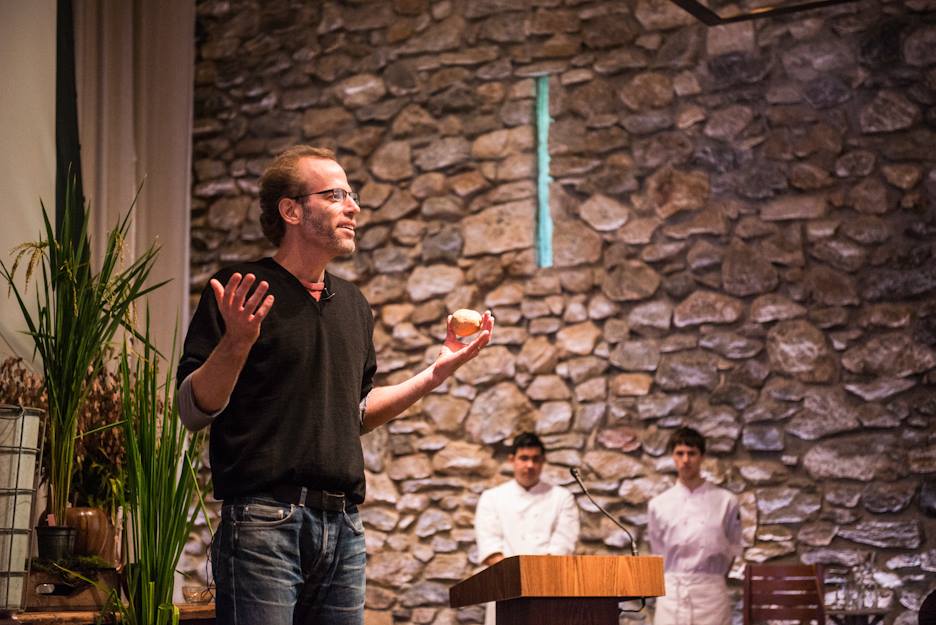You may have already heard about Dan Barber’s new book The Third Plate: Field Notes on the Future of Food. In addition to his recent op-ed in the Times, he’s made rounds on NPR’s Morning Edition and WNYC’s Leonard Lopate Show. Marion Nestle also blurbed about his book this week calling it “a welcome addition to any library” and complimenting Barber’s ability to write “as well as he cooks — and that’s very well indeed.”
Edible was also up close and personal with Barber this month when he spoke at the publisher’s portion of Edible Institute. His message was a powerful and provocative call-t0-arms directed at the farm-to-table movement that, despite influencing a larger eating and drinking culture, has yet to fundamentally change the political and economic forces shaping our food system. In fact, he said that the farm-to-table movement that we’re helping to create “does not really work” (um, is this really Dan Barber on stage, or some costumed, nay-saying robot?).
Of course this bold statement had a larger point; according to Barber, it’s a question of how we source some of our ingredients and how we think about food in a larger context. Basically, it’s time to change our entire eating and drinking paradigm.
His defense ultimately boils down to three main points:
1. The general perception of the farm-to-table movement “is the wrong way to think about the future of good food.” Why? It sets us up as passive end-of-the-chain users. We need to engage more with farmers to try to understand and utilize everything that they produce on their farm instead of just cherry-picking what we want. In other words, we should embrace all products that promote sustainable farming systems and create revenue streams for less-familiar ingredients (e.g., cover crops like cowpeas and mustard greens).
2. We should pay more attention to and celebrate the mid-size farmer. Farm-to-table tends to romanticize the small farmer while in fact about 40 percent of our food comes from the mid-size and diversified operations that, according to the USDA Census of Agriculture, will likely be extinct in 10 years. “It’s harder to tell the mid-size farm story, but it’s critical,” said Barber.
3. The type of system that he’s advocating for “really doesn’t work unless it’s tethered to a cuisine.” By “cuisine,” Barber was quick to add that he doesn’t want to imply an idea that’s “rarefied,” but instead an overarching eating pattern. He argued that all the great cuisines of the world evolved around what the land could give, not the other way around. They developed a pattern of eating that does not allow chefs and eaters to only take what they want, but makes use of the entire farming system.
How does this happen in our day and age? Barber admitted that he’s not sure where to begin, but a hope for this so-called cuisine “is why [he believes] so strongly in Edible” since our publications chronicle and celebrate local food culture (okay, this is in fact the Dan Barber we know and admire).
Barber concluded by calling for an eating pattern/cuisine/whatever you want to call it shift that actively dictates the use of in-between crops and animal products. “We need to change the culture, and farm-to-table doesn’t change the culture enough,” he said. “It’s too passive and it gives us an out too easily, and the next census will be even worse if we don’t figure this out. We need chefs to figure out these recipes. The challenge for the next 5 to 10 years is to create a pattern around a system that truly creates change from the ground up.”
Did you hear Barber speak at #Edible2014? What was your take-away? How do you think your community can embrace his call to action?
If you want to see Barber continue his tour de public radio in person, he’ll be in conversation with Ira Glass on June 11 at 92nd Street Y.
Featured photo credit: Facebook / Blue Hill



